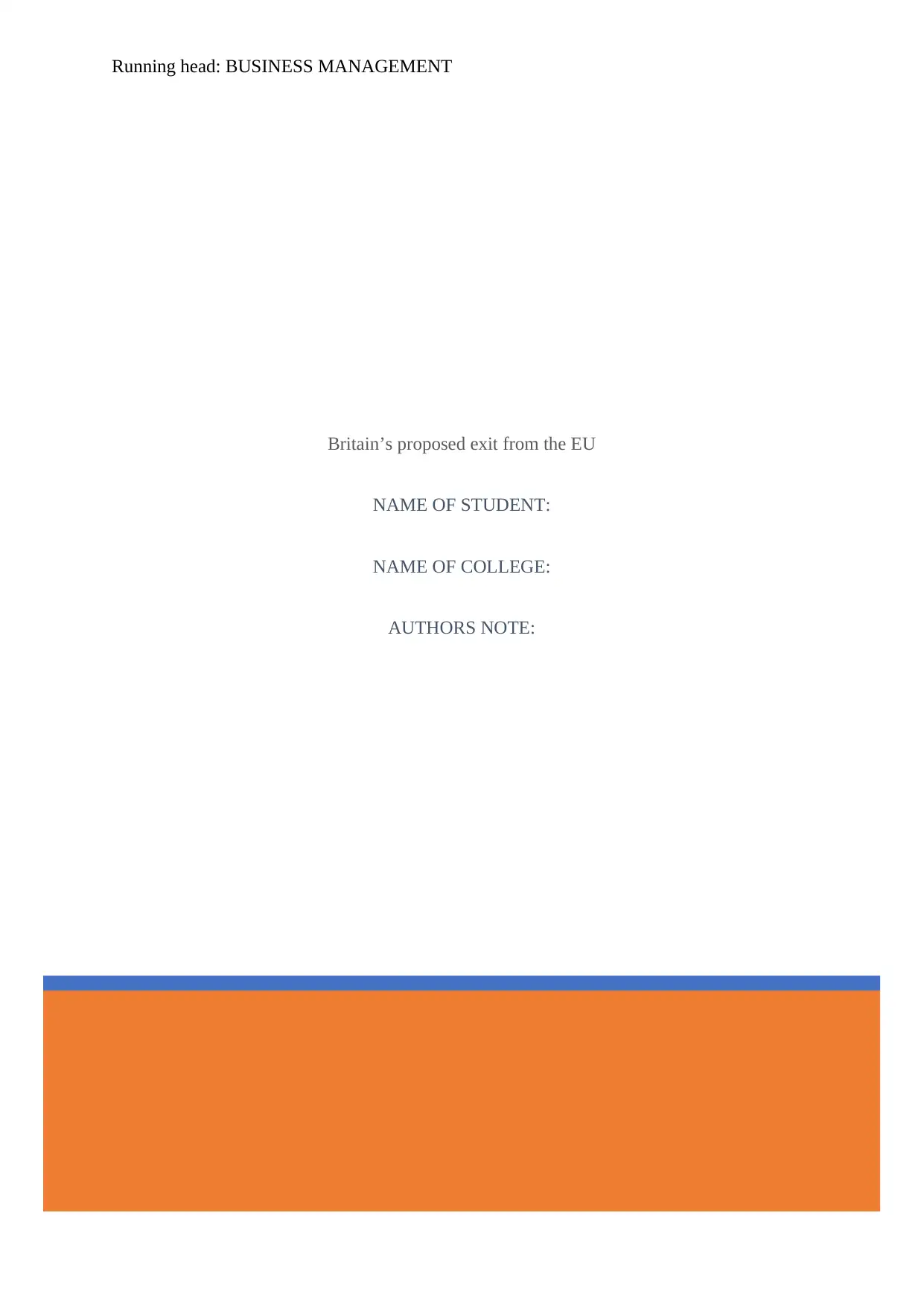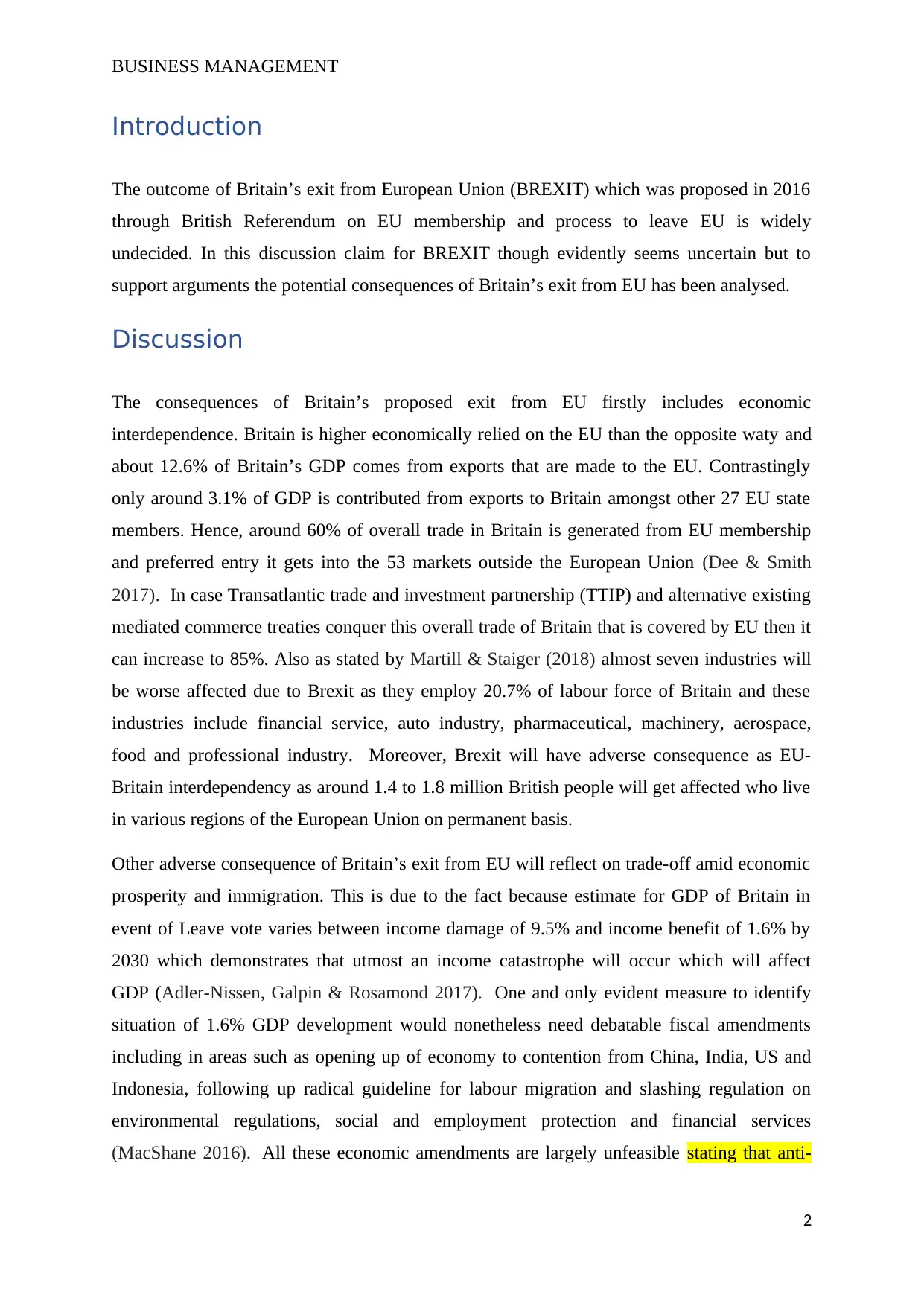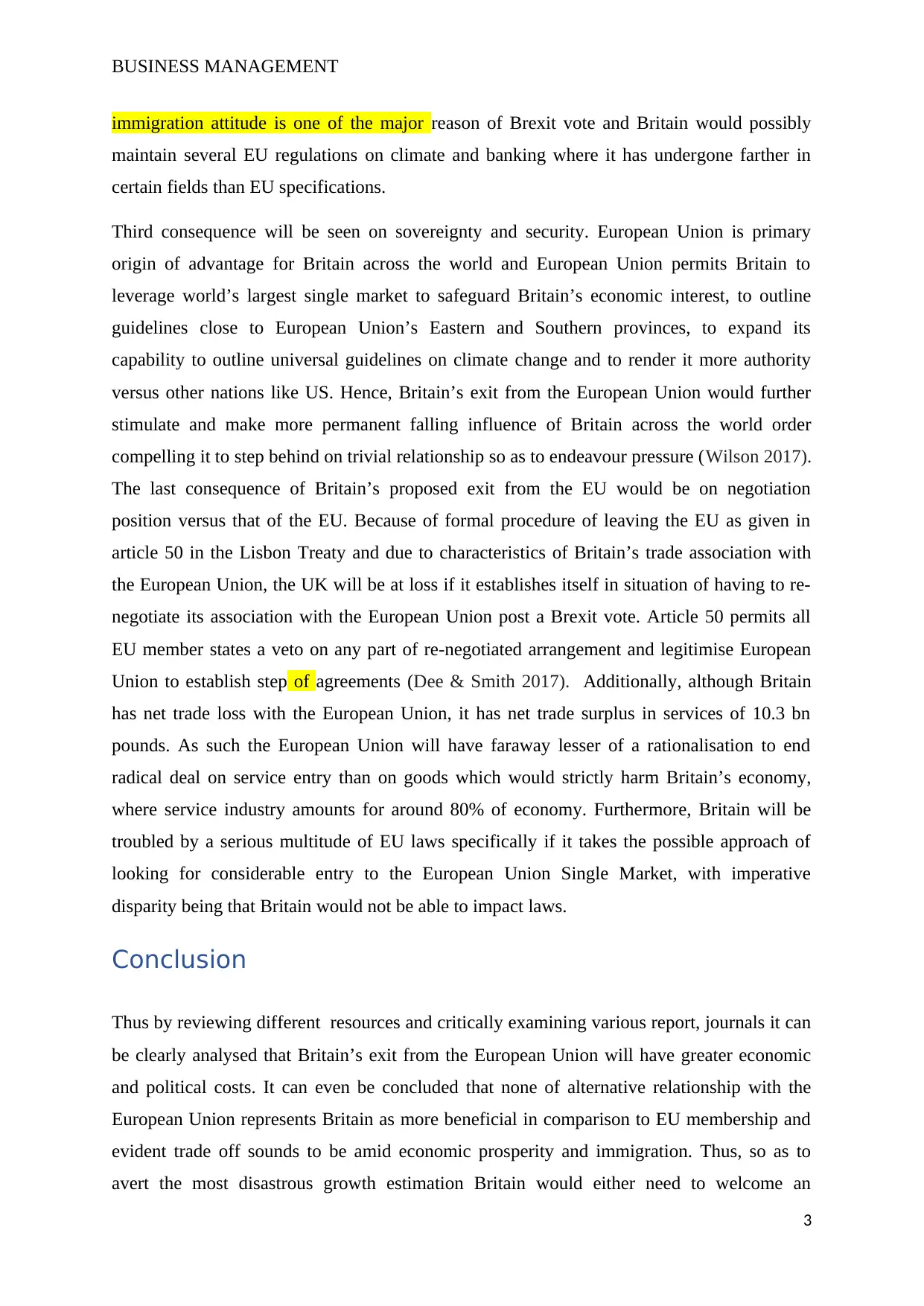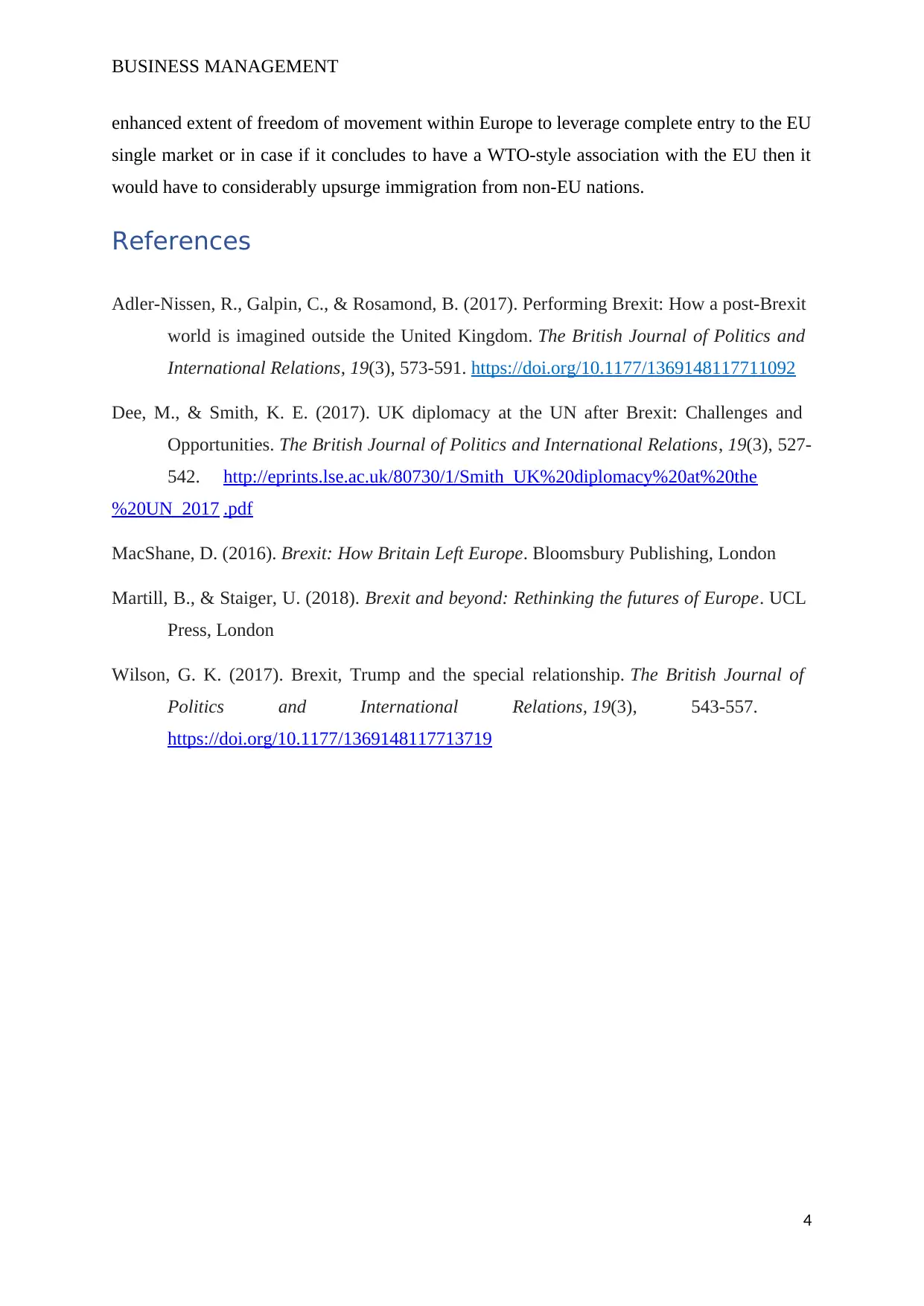Farhana Jahan's Business Essay: Analyzing Britain's BREXIT Impact
VerifiedAdded on 2023/01/17
|5
|1179
|47
Essay
AI Summary
This essay examines the multifaceted consequences of Britain's proposed exit from the European Union (BREXIT), analyzing its impact on various sectors and aspects. The introduction sets the stage by highlighting the uncertainty surrounding BREXIT's outcome and the need to analyze its potential consequences. The discussion delves into several key areas, including economic interdependence, where the reliance of Britain on the EU market is contrasted with the EU's dependence on Britain. The essay also explores the trade-offs between economic prosperity and immigration, analyzing the potential impact on Britain's GDP. Furthermore, the essay addresses the implications for sovereignty and security, discussing how BREXIT could diminish Britain's global influence. Finally, it examines the negotiation position of Britain in relation to the EU. The conclusion synthesizes the analysis, emphasizing the potential economic and political costs associated with BREXIT and highlighting the trade-offs between economic prosperity and immigration. The essay is supported by references to academic sources.

Britain’s proposed exit from the EU
NAME OF STUDENT:
NAME OF COLLEGE:
AUTHORS NOTE:
Running head: BUSINESS MANAGEMENT
NAME OF STUDENT:
NAME OF COLLEGE:
AUTHORS NOTE:
Running head: BUSINESS MANAGEMENT
Paraphrase This Document
Need a fresh take? Get an instant paraphrase of this document with our AI Paraphraser

BUSINESS MANAGEMENT
Contents
Introduction...........................................................................................................................................2
Discussion..............................................................................................................................................2
Conclusion.............................................................................................................................................3
References.............................................................................................................................................4
1
Contents
Introduction...........................................................................................................................................2
Discussion..............................................................................................................................................2
Conclusion.............................................................................................................................................3
References.............................................................................................................................................4
1

BUSINESS MANAGEMENT
Introduction
The outcome of Britain’s exit from European Union (BREXIT) which was proposed in 2016
through British Referendum on EU membership and process to leave EU is widely
undecided. In this discussion claim for BREXIT though evidently seems uncertain but to
support arguments the potential consequences of Britain’s exit from EU has been analysed.
Discussion
The consequences of Britain’s proposed exit from EU firstly includes economic
interdependence. Britain is higher economically relied on the EU than the opposite waty and
about 12.6% of Britain’s GDP comes from exports that are made to the EU. Contrastingly
only around 3.1% of GDP is contributed from exports to Britain amongst other 27 EU state
members. Hence, around 60% of overall trade in Britain is generated from EU membership
and preferred entry it gets into the 53 markets outside the European Union (Dee & Smith
2017). In case Transatlantic trade and investment partnership (TTIP) and alternative existing
mediated commerce treaties conquer this overall trade of Britain that is covered by EU then it
can increase to 85%. Also as stated by Martill & Staiger (2018) almost seven industries will
be worse affected due to Brexit as they employ 20.7% of labour force of Britain and these
industries include financial service, auto industry, pharmaceutical, machinery, aerospace,
food and professional industry. Moreover, Brexit will have adverse consequence as EU-
Britain interdependency as around 1.4 to 1.8 million British people will get affected who live
in various regions of the European Union on permanent basis.
Other adverse consequence of Britain’s exit from EU will reflect on trade-off amid economic
prosperity and immigration. This is due to the fact because estimate for GDP of Britain in
event of Leave vote varies between income damage of 9.5% and income benefit of 1.6% by
2030 which demonstrates that utmost an income catastrophe will occur which will affect
GDP (Adler-Nissen, Galpin & Rosamond 2017). One and only evident measure to identify
situation of 1.6% GDP development would nonetheless need debatable fiscal amendments
including in areas such as opening up of economy to contention from China, India, US and
Indonesia, following up radical guideline for labour migration and slashing regulation on
environmental regulations, social and employment protection and financial services
(MacShane 2016). All these economic amendments are largely unfeasible stating that anti-
2
Introduction
The outcome of Britain’s exit from European Union (BREXIT) which was proposed in 2016
through British Referendum on EU membership and process to leave EU is widely
undecided. In this discussion claim for BREXIT though evidently seems uncertain but to
support arguments the potential consequences of Britain’s exit from EU has been analysed.
Discussion
The consequences of Britain’s proposed exit from EU firstly includes economic
interdependence. Britain is higher economically relied on the EU than the opposite waty and
about 12.6% of Britain’s GDP comes from exports that are made to the EU. Contrastingly
only around 3.1% of GDP is contributed from exports to Britain amongst other 27 EU state
members. Hence, around 60% of overall trade in Britain is generated from EU membership
and preferred entry it gets into the 53 markets outside the European Union (Dee & Smith
2017). In case Transatlantic trade and investment partnership (TTIP) and alternative existing
mediated commerce treaties conquer this overall trade of Britain that is covered by EU then it
can increase to 85%. Also as stated by Martill & Staiger (2018) almost seven industries will
be worse affected due to Brexit as they employ 20.7% of labour force of Britain and these
industries include financial service, auto industry, pharmaceutical, machinery, aerospace,
food and professional industry. Moreover, Brexit will have adverse consequence as EU-
Britain interdependency as around 1.4 to 1.8 million British people will get affected who live
in various regions of the European Union on permanent basis.
Other adverse consequence of Britain’s exit from EU will reflect on trade-off amid economic
prosperity and immigration. This is due to the fact because estimate for GDP of Britain in
event of Leave vote varies between income damage of 9.5% and income benefit of 1.6% by
2030 which demonstrates that utmost an income catastrophe will occur which will affect
GDP (Adler-Nissen, Galpin & Rosamond 2017). One and only evident measure to identify
situation of 1.6% GDP development would nonetheless need debatable fiscal amendments
including in areas such as opening up of economy to contention from China, India, US and
Indonesia, following up radical guideline for labour migration and slashing regulation on
environmental regulations, social and employment protection and financial services
(MacShane 2016). All these economic amendments are largely unfeasible stating that anti-
2
⊘ This is a preview!⊘
Do you want full access?
Subscribe today to unlock all pages.

Trusted by 1+ million students worldwide

BUSINESS MANAGEMENT
immigration attitude is one of the major reason of Brexit vote and Britain would possibly
maintain several EU regulations on climate and banking where it has undergone farther in
certain fields than EU specifications.
Third consequence will be seen on sovereignty and security. European Union is primary
origin of advantage for Britain across the world and European Union permits Britain to
leverage world’s largest single market to safeguard Britain’s economic interest, to outline
guidelines close to European Union’s Eastern and Southern provinces, to expand its
capability to outline universal guidelines on climate change and to render it more authority
versus other nations like US. Hence, Britain’s exit from the European Union would further
stimulate and make more permanent falling influence of Britain across the world order
compelling it to step behind on trivial relationship so as to endeavour pressure (Wilson 2017).
The last consequence of Britain’s proposed exit from the EU would be on negotiation
position versus that of the EU. Because of formal procedure of leaving the EU as given in
article 50 in the Lisbon Treaty and due to characteristics of Britain’s trade association with
the European Union, the UK will be at loss if it establishes itself in situation of having to re-
negotiate its association with the European Union post a Brexit vote. Article 50 permits all
EU member states a veto on any part of re-negotiated arrangement and legitimise European
Union to establish step of agreements (Dee & Smith 2017). Additionally, although Britain
has net trade loss with the European Union, it has net trade surplus in services of 10.3 bn
pounds. As such the European Union will have faraway lesser of a rationalisation to end
radical deal on service entry than on goods which would strictly harm Britain’s economy,
where service industry amounts for around 80% of economy. Furthermore, Britain will be
troubled by a serious multitude of EU laws specifically if it takes the possible approach of
looking for considerable entry to the European Union Single Market, with imperative
disparity being that Britain would not be able to impact laws.
Conclusion
Thus by reviewing different resources and critically examining various report, journals it can
be clearly analysed that Britain’s exit from the European Union will have greater economic
and political costs. It can even be concluded that none of alternative relationship with the
European Union represents Britain as more beneficial in comparison to EU membership and
evident trade off sounds to be amid economic prosperity and immigration. Thus, so as to
avert the most disastrous growth estimation Britain would either need to welcome an
3
immigration attitude is one of the major reason of Brexit vote and Britain would possibly
maintain several EU regulations on climate and banking where it has undergone farther in
certain fields than EU specifications.
Third consequence will be seen on sovereignty and security. European Union is primary
origin of advantage for Britain across the world and European Union permits Britain to
leverage world’s largest single market to safeguard Britain’s economic interest, to outline
guidelines close to European Union’s Eastern and Southern provinces, to expand its
capability to outline universal guidelines on climate change and to render it more authority
versus other nations like US. Hence, Britain’s exit from the European Union would further
stimulate and make more permanent falling influence of Britain across the world order
compelling it to step behind on trivial relationship so as to endeavour pressure (Wilson 2017).
The last consequence of Britain’s proposed exit from the EU would be on negotiation
position versus that of the EU. Because of formal procedure of leaving the EU as given in
article 50 in the Lisbon Treaty and due to characteristics of Britain’s trade association with
the European Union, the UK will be at loss if it establishes itself in situation of having to re-
negotiate its association with the European Union post a Brexit vote. Article 50 permits all
EU member states a veto on any part of re-negotiated arrangement and legitimise European
Union to establish step of agreements (Dee & Smith 2017). Additionally, although Britain
has net trade loss with the European Union, it has net trade surplus in services of 10.3 bn
pounds. As such the European Union will have faraway lesser of a rationalisation to end
radical deal on service entry than on goods which would strictly harm Britain’s economy,
where service industry amounts for around 80% of economy. Furthermore, Britain will be
troubled by a serious multitude of EU laws specifically if it takes the possible approach of
looking for considerable entry to the European Union Single Market, with imperative
disparity being that Britain would not be able to impact laws.
Conclusion
Thus by reviewing different resources and critically examining various report, journals it can
be clearly analysed that Britain’s exit from the European Union will have greater economic
and political costs. It can even be concluded that none of alternative relationship with the
European Union represents Britain as more beneficial in comparison to EU membership and
evident trade off sounds to be amid economic prosperity and immigration. Thus, so as to
avert the most disastrous growth estimation Britain would either need to welcome an
3
Paraphrase This Document
Need a fresh take? Get an instant paraphrase of this document with our AI Paraphraser

BUSINESS MANAGEMENT
enhanced extent of freedom of movement within Europe to leverage complete entry to the EU
single market or in case if it concludes to have a WTO-style association with the EU then it
would have to considerably upsurge immigration from non-EU nations.
References
Adler-Nissen, R., Galpin, C., & Rosamond, B. (2017). Performing Brexit: How a post-Brexit
world is imagined outside the United Kingdom. The British Journal of Politics and
International Relations, 19(3), 573-591. https://doi.org/10.1177/1369148117711092
Dee, M., & Smith, K. E. (2017). UK diplomacy at the UN after Brexit: Challenges and
Opportunities. The British Journal of Politics and International Relations, 19(3), 527-
542. http://eprints.lse.ac.uk/80730/1/Smith_UK%20diplomacy%20at%20the
%20UN_2017 .pdf
MacShane, D. (2016). Brexit: How Britain Left Europe. Bloomsbury Publishing, London
Martill, B., & Staiger, U. (2018). Brexit and beyond: Rethinking the futures of Europe. UCL
Press, London
Wilson, G. K. (2017). Brexit, Trump and the special relationship. The British Journal of
Politics and International Relations, 19(3), 543-557.
https://doi.org/10.1177/1369148117713719
4
enhanced extent of freedom of movement within Europe to leverage complete entry to the EU
single market or in case if it concludes to have a WTO-style association with the EU then it
would have to considerably upsurge immigration from non-EU nations.
References
Adler-Nissen, R., Galpin, C., & Rosamond, B. (2017). Performing Brexit: How a post-Brexit
world is imagined outside the United Kingdom. The British Journal of Politics and
International Relations, 19(3), 573-591. https://doi.org/10.1177/1369148117711092
Dee, M., & Smith, K. E. (2017). UK diplomacy at the UN after Brexit: Challenges and
Opportunities. The British Journal of Politics and International Relations, 19(3), 527-
542. http://eprints.lse.ac.uk/80730/1/Smith_UK%20diplomacy%20at%20the
%20UN_2017 .pdf
MacShane, D. (2016). Brexit: How Britain Left Europe. Bloomsbury Publishing, London
Martill, B., & Staiger, U. (2018). Brexit and beyond: Rethinking the futures of Europe. UCL
Press, London
Wilson, G. K. (2017). Brexit, Trump and the special relationship. The British Journal of
Politics and International Relations, 19(3), 543-557.
https://doi.org/10.1177/1369148117713719
4
1 out of 5
Related Documents
Your All-in-One AI-Powered Toolkit for Academic Success.
+13062052269
info@desklib.com
Available 24*7 on WhatsApp / Email
![[object Object]](/_next/static/media/star-bottom.7253800d.svg)
Unlock your academic potential
Copyright © 2020–2025 A2Z Services. All Rights Reserved. Developed and managed by ZUCOL.




